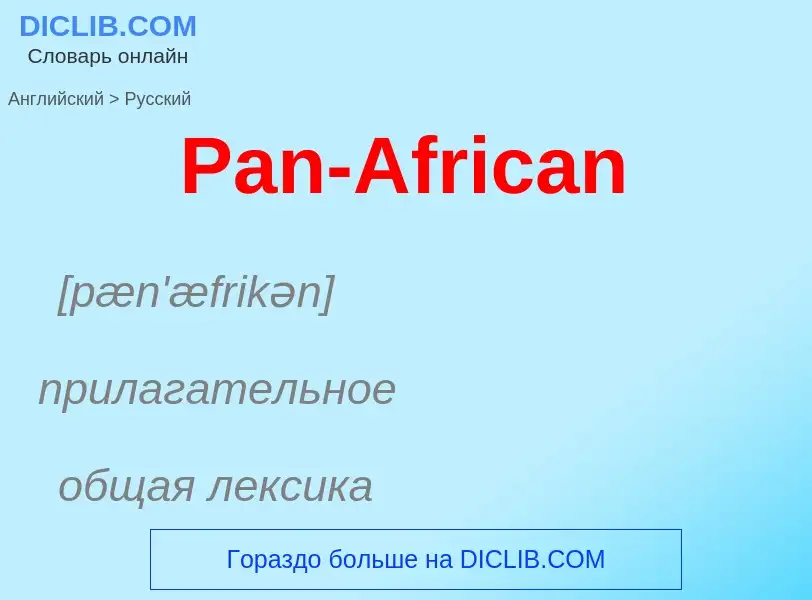Перевод и анализ слов искусственным интеллектом ChatGPT
На этой странице Вы можете получить подробный анализ слова или словосочетания, произведенный с помощью лучшей на сегодняшний день технологии искусственного интеллекта:
- как употребляется слово
- частота употребления
- используется оно чаще в устной или письменной речи
- варианты перевода слова
- примеры употребления (несколько фраз с переводом)
- этимология
Pan-African - перевод на русский
[pæn'æfrikən]
прилагательное
общая лексика
панафриканский
[pæn'æfrikəniz(ə)m]
существительное
общая лексика
панафриканизм
Определение
Википедия
Pan-Africanism is a worldwide movement that aims to encourage and strengthen bonds of solidarity between all indigenous and diasporas of African ancestry. Based on a common goal dating back to the Atlantic slave trade, the movement extends beyond continental Africans with a substantial support base among the African diaspora in the Americas and Europe.
Pan-Africanism can be said to have its origins in the struggles of the African people against enslavement and colonization and this struggle may be traced back to the first resistance on slave ships—rebellions and suicides—through the constant plantation and colonial uprisings and the "Back to Africa" movements of the 19th century. Based on the belief that unity is vital to economic, social, and political progress and aims to "unify and uplift" people of African ancestry.
At its core, pan-Africanism is a belief that "African people, both on the continent and in the diaspora, share not merely a common history, but a common destiny." Pan-Africanist intellectual, cultural, and political movements tend to view all Africans and descendants of Africans as belonging to a single "race" or otherwise sharing cultural unity. Pan-Africanism posits a sense of a shared historical fate for Africans in America, West Indies, and on the continent, itself centered on the Atlantic trade in slaves, African slavery, and European imperialism.
Pan-African thought influenced the establishment of the Organisation of African Unity (since succeeded by the African Union) in 1963. The African Union Commission has its seat in Addis Ababa and the Pan-African Parliament has its seat in Midrand, Johannesburg.

![Westminster Town Hall]], London, July 1900. Westminster Town Hall]], London, July 1900.](https://commons.wikimedia.org/wiki/Special:FilePath/Invitation to Pan-African Conference at Westminster Town Hall July 1900.png?width=200)

![Jamaican [[Marcus Garvey]] in a military uniform as the "Provisional President of Africa" during a parade on the opening day of the annual Convention of the Negro Peoples of the World on Lenox Avenue in [[Harlem]], New York City, 1922. Jamaican [[Marcus Garvey]] in a military uniform as the "Provisional President of Africa" during a parade on the opening day of the annual Convention of the Negro Peoples of the World on Lenox Avenue in [[Harlem]], New York City, 1922.](https://commons.wikimedia.org/wiki/Special:FilePath/Marcus Garvey (1922).jpg?width=200)
![[[Muammar Gaddafi]] at the first Africa–Latin America summit in 2006 in [[Abuja]], [[Nigeria]]. [[Muammar Gaddafi]] at the first Africa–Latin America summit in 2006 in [[Abuja]], [[Nigeria]].](https://commons.wikimedia.org/wiki/Special:FilePath/Muammar al-Gaddafi-6-30112006.jpg?width=200)
![A mural in [[Ujiji]], [[Tanzania]]. A mural in [[Ujiji]], [[Tanzania]].](https://commons.wikimedia.org/wiki/Special:FilePath/Pan Africanism mural in Tanzania.jpg?width=200)
![[[Kwame Nkrumah]], an icon of pan-Africanism. [[Kwame Nkrumah]], an icon of pan-Africanism.](https://commons.wikimedia.org/wiki/Special:FilePath/The National Archives UK - CO 1069-50-1.jpg?width=200)
